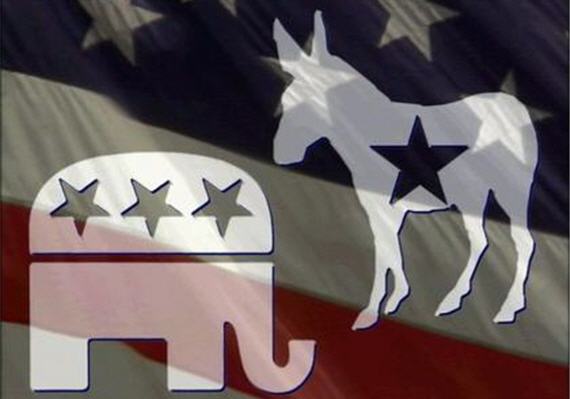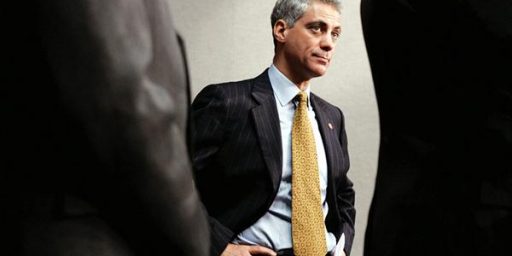When It Comes To Ideological Purity, Democrats Can Be As Dumb As Republicans
A call for ideological purity in the Democratic Party in today's New York Times demonstrates that Democrats can be just as foolish as Republicans.
In today’s New York Times Ari Berman, a writer for The Nation, makes the case for booting the s0-called Blue Dog Democrats out of the Democratic Party:
In conservative Democrats in the House of Representatives — whose election in 2006 and 2008 enabled Nancy Pelosi to preside over a supermajority (there are 255 Democrats and 178 Republicans) — increasingly question whether she should relinquish her position as speaker. Representative Heath Shuler of western North Carolina, a leader of the restive Blue Dog Coalition of Democrats, has even hinted that he may run for her job. Representative Shuler is an unlikely candidate for leader of the party — a devout Southern Baptist who voted against the stimulus, the bank and auto bailouts and health care reform. Yet he’s exactly the kind of Democrat that the party worked very hard to recruit for public office.
In 2005, Howard Dean, who was then the chairman of the Democratic National Committee, carried out a campaign to elect as many Democrats as possible. In long-ignored red states, both Mr. Dean and Rahm Emanuel, then the chairman of the Democratic Congressional Campaign Committee, backed conservative Democrats who broke with the party’s leadership on core issues like gun control and abortion rights. Mr. Shuler was one of Mr. Emanuel’s top recruits. The party leaders did not give much thought to how a Democratic majority that included such conservative members could ever effectively govern.
(…)
Margaret Johnson, a former party chairwoman in Polk County, N.C., helped elect Representative Shuler but now believes the party would be better off without him. “I’d rather have a real Republican than a fake Democrat,” she said. “A real Republican motivates us to work. A fake Democrat de-motivates us.”
Ms. Johnson is right: Democrats would be in better shape, and would accomplish more, with a smaller and more ideologically cohesive caucus. It’s a sentiment that even Mr. Dean now echoes. “Having a big, open-tent Democratic Party is great, but not at the cost of getting nothing done,” he said. Since the passage of health care reform, few major bills have passed the Senate. Although the Democrats have a 59-vote majority, party leaders can barely find the votes for something as benign as extending unemployment benefits.
Of course what Berman, Johnson, and Dean fail to acknowledge is that it’s entirely likely that without candidates like Schuler and other conservative and moderate Democrats, the party might not even have control of the House of Representatives right now to begin with. That was the reason, after all, that Emanuel and Dean set about recruiting these types of candidates back in 2005. Back then, Republicans held on to a slim 14 seat majority in the House and the idea behind the Emanuel/Dean plan was that if the Democrats were going to win back a majority, they would have to go after Republican-held seats in moderate Districts. While dis-satisfaction with the Bush Administration played a huge role in the final outcome of the 2006 elections, it’s fairly clear recruiting candidates like Schuler played a large role in giving Democrats control of Congress for the first time in twelve years. Casting those Democrats (In Name Only ?) aside as Berman suggests would only hurt the party. Heath Schuler, for example, wouldn’t be replaced by a progressive Democrat, he’d be replaced by a likely more conservative Republican. How, exactly, is that smart politics?
Republicans have taken the same tack over the years, and we can see the results of it quite easily. Thanks to foolish crusades against “Republicans In Name Only,” the GOP after 2006 had virtually no representation in the Northeast outside of Senators like Olympia Snowe and Susan Collins, both of whom have long been the bane of conservative Republicans for years. Even after the GOP started to experience a Northeastern renaissance with the election of Scott Brown in Massachusetts, the quest for ideological purity didn’t go away. On those occasions when Scott Brown, or Chris Christie, have strayed from GOP orthodoxy on issues like extension of unemployment benefits, offshore oil drilling, or cap-and-trade, they’ve been foolishly denounced as “RINOs” and some Republicans have even said they should be challenged in future primaries by more conservative Republicans. Of course, nominating someone further to the right of Scott Brown in 2012 would merely mean handing the seat to the Democrats, but the ideological purists don’t seem to care. Perhaps the most absurd act of ideological purity, though, came in Christine O’Donnell’s defeat of Mike Castle in the GOP Senate primary this summer, an event which guarantees that a once winnable seat will state in the Democratic camp.
What this quest for ideological purity in both parties forgets is the fact that America’s major political parties have never been overly ideological. While there have always been a core set of principles that unite Republicans and Democrats, there has typically been enough room within that core to allow for regional variations. The Republican Party of 1978, for example, was broad enough to include Ronald Reagan and Charles Percy of Illinois, and that year Reagan campaigned vigorously for Percy even though the two disagreed on many issues, and despite the fact that there was a more conservative candidate running as an Independent. Similarly, the Democratic Party of 2006 was broad enough to include Nancy Pelosi and Heath Schuler. Writing Schuler out of the party as Berman suggests, which many just send him into the arms of the GOP, strikes me as foolish in the long run, just as it was ultimately foolish for conservatives to unite behind a flaky candidate just to punish Mike Castle for the “sin” of supporting cap-and-trade.
Like those conservative Republicans, Berman seems to think that the solution to the Democratic Party’s problems is to make it more liberal. They are both letting their ideology blind them to the realities of American politics.







Bernieyeball sez:
This has never happened before.
Oh wait…let’s see.
There was Barry Goldwater, Hubert Humphrey, George McGovern, …did delegates to the conventions that nominated these candidates live in some alternate universe or were they all from Deleware?
Hubert Humphrey?
He was about as mainstream as you can get…
Let’s see… The GOP is left of center, the Democrat party is far out wacko left… And someone’s complaining that Democrats aren’t pure liberal ( idiot) enough?
Frankly, I don’t see the condemnation of “dumb” here. If we examine the Constitution, and how it limits the federal government, neither the GOP nor Democrats follow it even a smidgeon, so if there’s a “purity” test, what ‘test” would it be?
Is the writer complaining that the Democrat Party is failing to agree on specific policy positions? Because parties in the US, at least, are hardly what you call “ideological homes”. They morph and wander the political spectrum haphazardly, with little principled commitment to anything. The Democrat party hardly claims purity of socialism – the ideological version. The GOP is only vaguely away from that, but doesn’t exactly have any claim to any specific ideological “anchor point”.
From a purely practical standpoint, having a party with a majority that wants X and a large contingent that wants the opposite, then making X that party’s centerpiece is self defeating. Ya’ll got to be on the same page in order to force it upon the public as they’ve been trying to do. and that gets quite obvious when a signficant contingent of the party’s caucus is pressured by their voting base to not go along.
The problem we have here, is that Democrats have a single belief, that all power, wealth, and decisions belong in Congress, for all matters and issues. No Democrat of importance in the last 40 years has promoted devolving power or control or decisions toward the states or people, and every issue to make the news results in Democrats attempting to control or “fix” it by federal takeover. Hardly deniable – since you can’t find a single important issue which they haven’t taken that approach on.
But, Democrats DO NOT CAMPAIGN ON THAT BASIS. They have a specific policy – perhaps ideology or ideologically based policy – of federalizing every issue, but never make it official, and in fact, deny it publicly. This is what makes things difficult. If you’re dishonest about what you want to do, then you can’t complain that everyone fails to go along with the agenda. The party has an obvious want to have a majority, so it can seat committee chairs, get the speaker positions, etc, and so some people have to go home and say the exact opposite of the agenda. This has seemed perfectly fine before, but now that you have a president who will sign anything, no matter how radically to the left it is, those who count the numbers suddenly notice that a few of the members won’t go along with the ones on top.
The Democrats had the numbers, by numbers only, to do anything without opposition, and now, those who wanted to pursue agenda recognize the obstruction having non-aligned members are – that the “big tent” is useless when you want to bypass the voter’s wants.
It isn’t ‘dumb’ to want to have the whole party on the same page for policy purposes. It’s a simple disagreement about the value of numbers vs the value of numbers who are in agreement. One faction wanted the numbers at any policy disagreement costs, believing that party members can be strongarmed into following the leaderships demands, the other thinks you must have already committed policy agreement.
That argument will never go away.
Part of reason the GOP lost seats in conservative districts is they ran liberal Republicans against conservative sounding Democrats. Unfortunately once in office the Democrats pretty much voted lockstep with their leadership.
I don’t expect Republicans in liberal states to be “as” conservative as in conservative state. However this idea that we must out liberal the Democrats is foolish especially in conservative states. The idea of winning at all cost is foolish. I also think that many of the conservative ideas are sellable to the liberal states.
You needed the NYTimes to tell you this? Really?
That’s funny… the GOP gets more conservative, and they’re now kicking the Libs hindquarters. And the ones getting kicked the most are generally the more liberal dems. GOP “purity” = dems lose big. Dem “purity” = even more Dems losing because the pure liberals are usually far out of step with America. This includes most of them, but the majority know how to keep it hidden.
No, I don’t really think that the GOPs problem this mid-term is being “too conservative.” The polls show otherwise, as will the election results just around the corner.
“GOP “purity” = dems lose big”
Really? You mean Christine has a better chance of beating Coons than Mike Castle did?
You mean Sharon Angle has a better chance of beating Harry Reid than Sue Lowden would have? That Rand Paul has a better shot than Trey Grayson would have? Paladino a better shot than Rick Lazio?
“Dem “purity” = even more Dems losing because the pure liberals are usually far out of step with America. ”
So are you admitting that Obama is not a “pure liberal” but rather a centrist (since he won convincingly) or are you admitting that you hypothesis is nonsense?
“the pure liberals are usually far out of step with America. ”
Lets look at the favorability ratings of ,,,oh,,,,lets say Obama and Palin. Or their suitability to be President. What does that tell you about who is or is not “in step with America”.
Or even just approval ratings of the Democratic Party vs. the Republican party in Congress.
Approval of Party
ABC poll – Dems 36 GOP 30
Pew poll Dems – 30. GOP – 24
AP poll Dems – 37, GOP – 30
FOX poll Dems – 37, GOP – 31
Yeah, it does seem as though the people are going to lodge a protest vote, a protest of the fact that things are still tough out there. But the unanimous verdict of every poll I have seen is that the people hate the GOP even more than the Dems – an absolutely stunning result for a party out of power in tough times.
If the GOP cannot even get more favorable poll numbers in an environment like this, on what basis, besides wishful thinking, do you imagine you can claim that it is the Dems that are more out of touch with “the people”?
Doug – do you ever read the comments in here, look at the people you have chosen to align yourself with, and cry yourself to sleep? if not, why not?
Wayne writes:
“However this idea that we must out liberal the Democrats is foolish especially in conservative states.”
Huh?
Could you give me one example of any Republican who is “out-liberaling” the Democrats. anywhere? Let alone in a conservative state?
As far as I can see, the most liberal Republican in the country is probably at best even with, or more likely still to the right of the most conservative Dem. And that is sampling across the country (e.g. Ben Nelson and Olympia Snowe). If you look in the same state, or the same race, then I can’t imagine where you would find any Repub to the left of a Dem.
Tano
I was talking about election 2008. Many of the Southern States ads that I saw had the Dem sounding more conservative than the Rep. The Rep was trying to run as so call moderates. This year people are so upset with Obama that many Dems are campaigning against him. Manchin in West Virginia is “trying” to run further to the right than his opponent.
Anjin, Doug more often than not alines with you and that being true, he should cry himself to sleep as do any related to you, either by blood or association. None exemplifies the stupidity of the left better than you. Oh, wait, I forgot about our brother, Mantis. Cojoined twins connected at the buttocks.
Wayne, I must say, I do not see it that way.
Politicians, if they are sufficiently competent to even be contenders, can get a pretty good sense of where their district is, politically. And they both aim for that, from different directions.
If the district is centrist, then the Dem will need to make some loud exclamations of how he is more to the right than what many would assume. And the Repub needs to make noises sounding more left than expected. So a casual observer might think the Dem is actually campaigning to the right of the Repub, and vice versa. But they almost never really are – it just seems that way because they break with thier party’s orthodoxy on a few prominent issues, and those are the ones that get headlines.
Manchin for example, is certainly sounding rather conservative, but look carefully at his portfolio of positions, and at Raese’s, and I don’t you would doubt for a moment who is the Dem and who the Rep.
It´s more complicated than that. Historically, the big difference between the two parties is that the Republicans used to be a more urban and middle class while the Democrats used to be more populist and more rural and more working class. Sure, you´d have very liberal Republicans, and very Conservative Republicans. But both of them shared a middle class, a urban base. There was a big difference between John Stennis and Everett Dirksen.
Today, we have a populist Republican Party, at odds with it´s History, while on the same time we have a very elitist Democratic Party. In the end, there is a big number of Working class people socially conservative while they are economic liberals, and a big number of people in the suburbs that aren´t social conservatives that have no representation in both parties.